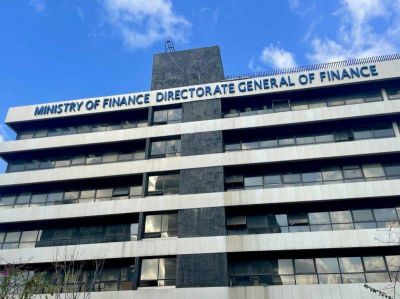
A group of retirees from the Lebanese military forces, blocking one of the access to the Grand Serail, Friday, Feb. 23, 2024. (Photo provided by Georges Nader)
BEIRUT — Outgoing Prime Minister Najib Mikati announced on Friday that he was postponing the Council of Ministers meeting schedule for 2 p.m. that day, due to Lebanese Army veterans having blocked all access to the Grand Serail. Mikati did not specify a new date for the meeting.
The Council of Ministers was meant to meet on the subject of restructuring the banking sector, which has been dysfunctional since Lebanon's multi-dimensional crisis began in 2019. But the protests outside the Grand Serail were focused on one particular subject, which didn't appear on the agenda: Civil service salaries and the unequal distribution of bonuses.
To put pressure on the government, the retired military personnel issued an ultimatum at the beginning of the week, demanding that a bill be prepared — outlining adequate adjustments toward fair wages — and approved at the Council, failing which, the veterans would resort to escalation and "mutiny."
In the absence of any response from the authorities, they followed through with their ultimatum and organized to block access to the Serail.
In Friday's statement, aired on LBCI TV and addressing the frustrated public sector workers, Mikati claimed that while he recognizes the injustice they experience, the government is "limited by ceilings that we do not have the means to exceed."
But the meeting's postponement only aggravated the situation further. The retired soldiers announced that they would remain stationed, in protest, at the entrances to the Grand Serail, until they receive an official statement from Cabinet. Mikati's remarks are only proof that their demands have not been heard.
Speaking with L'Orient Today, retired General Georges Nader exclaimed: "Najib Mikati says he is astonished that we have opted for escalation. But where does he live? Can't he see that we've been demonstrating since the beginning of the crisis? That retired soldiers are starving? That they can't find jobs because they're sick or too old? Doesn't he hear the complaints of soldiers' families in Akkar or Hermel who can't manage to keep warm in this harsh winter?"
Andre Abou Maachar, a spokesperson for the retirees, explained that their demands include a minimum salary of around 450 dollars a month, which could serve as a basis for the adoption of a new salary scale for the entire civil service.
Retired members of the Lebanese Armed Forces number just over 70,000, including the families of deceased soldiers. They are demanding a readjustment of their monthly retirement allowances to at least 40 percent of their initial salary.
Since the collapse of the Lebanese pound, their monthly pay has been worth next to nothing, despite a few cosmetic adjustments.
"Is it normal that I, an army general, whose position is equivalent to that of a first-rate civil servant, should now receive only $400 a month, including benefits, after serving my country for 35 years?" Nader laments.
"Is it normal that soldiers' widows and retired soldiers are forced to live on 70 dollars a month, or in the best case scenario, 100 dollars a month? We just want to live with dignity, eat and drink."
The veteran's string of protests coincide with wage demands from the entire civil service. Civil servants as a whole held an open strike on Thursday protesting the dollarization of taxes and the unequal distribution of salary increases and financial aid in the public sector.
The bonus would be equivalent to 20 percent of the civil servants' salaries and would not have affected pensions. Those currently receiving the payments will continue receiving them for the next two months, but a decision from the Council of Ministers will determine whether payments will be authorized for the following months.
The controversial bonuses were reserved for only select areas of public administration — in particular the Ministry of Finance, several surveillance institutions, the staff of the Grand Serail, staff of Council of Ministers president headquarters and staff of the Presidential Palace.
Faced with anger from those excluded, outgoing Prime Minister asked outgoing Finance Minister on Thursday to freeze the bonuses, and it was in this context that Finance Ministry officials, some of whom feel they are unjustly privileged, called on outgoing Finance Minister Youssef el-Khalil "to publish the sums granted to other sectors of the civil service."
The 2024 budget made permanent the 2023 salary adjustments that increased civil servants' wages sevenfold, responding to the inflation that rendered their old salaries basically useless.
The budget also set aside LL 20,000 billion ($223.5 million at current market rates) to finance these "productivity bonuses." Expenditure allocated to salaries and wages amounts to over 45 trillion pounds in the budget ($513 million) or 17 percent of total expenditure, according to L'Orient-Le Jour's calculations, not including the productivity bonus.

